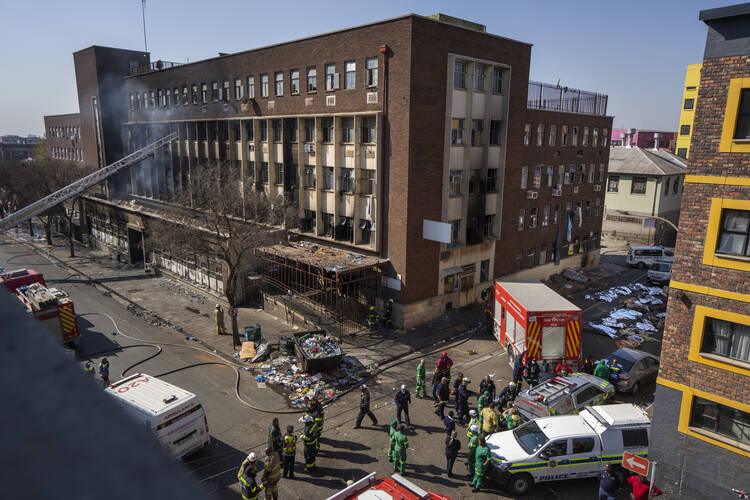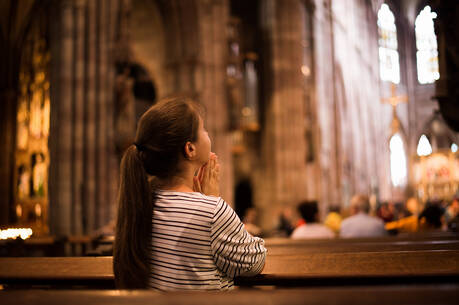In the early morning hours of Aug. 31, 77 people, including 12 children, died in a burning building in downtown Johannesburg, South Africa. Terrible images on television showed the gutted and smoldering building and emergency workers removing bodies and placing them on the street outside the apartment complex.
Many of the victims were burned beyond recognition. More than 30 people remain hospitalized with burns and other injuries. Several people were injured jumping from windows to escape the inferno.
The city of Johannesburg owns the fire-devastated property, located in the city’s Marshalltown neighborhood. More than 12 hours after the fire, however, city officials could still not tell the public who lived there. One official said that rooms in the building had been “hijacked” and rented out by criminal gangs.
Following the tragedy, the Southern African Catholic Bishops’ Conference issued a statement that decried those who “unscrupulously exploit the homeless and the poor, forcing them to live in inhumane and dangerous situations while charging them rent for the ‘privilege’ to live in such death traps. It is symptomatic of the widespread sense of lawlessness that prevails in our country that such illegality is allowed to happen and goes unpunished.”
Abandoned buildings are “hijacked” by criminal syndicates that begin illegally renting them out. People renting rooms in these typically overcrowded buildings are poor, vulnerable and desperate.
The bishops expressed their condolences to families who lost loved ones and thanked first responders for the work they did rescuing survivors.
In the hours after the fire, city officials and government ministers blamed immigrants and civil society organizations for the disaster.
Khumbudzo Ntshavheni, South Africa’s minister in the presidency, told local media that the “majority of those who reside in hijacked buildings are not South African, and they are not in this country legally,” adding that “the government cannot provide housing to illegal immigrants.”
The bishops’ conference condemned Ms. Ntshavheni’s remarks, describing them as a disingenuous attempt “to shift blame and scapegoat foreign nationals—as if some lives are less important than others. Such a cold, uncompassionate response from a senior leader in government is profoundly disturbing.”
Kenny Kunene, a member of the Johannesburg Mayoral Committee, said that undocumented migrants are a problem in the city. He called for “mass deportations” and said the city was losing revenue from unlawful water and electricity connections. He also blamed current property law and civic organizations who work for human rights for the problem of property squatting and hijacking.
South African bishops condemned attempts “to shift blame and scapegoat foreign nationals—as if some lives are less important than others.”
In their statement, the South African bishops responded to anti-immigrant sentiments. They said they were “deeply disturbed by some political statements that attempt to diminish the depth of the tragedy because illegal immigrants are among those killed. Those who died were people—our brothers and sisters—and to dismiss them as ‘illegal immigrants’ perpetuates the dangerous anti-immigrant rhetoric that is being normalized.”
The building was constructed under the apartheid government and was originally used as a site where permits, called “passes,” were given to black South Africans so they could live and work in the “whites-only” areas of Johannesburg. After the fall of apartheid in 1994, the building was transformed from a place of oppression into a place of hope. It became a women’s shelter and health clinic. The failure of the local government to support that project allowed it to eventually collapse and the building itself to become “hijacked.”
The Daily Maverick reported that a bogus landlord was jailed five years ago for illegally collecting rent from tenants at the now destroyed site. According to the report, more than 140 undocumented foreign nationals lived in the five-story structure at that time, but residency at the hijacked site eventually grew to include more than 200 families and, by one estimate, as many as 1,000 people.
Maurice Smithers, an urban activist in Johannesburg, said that the building had been an iconic place, charging that city officials had “effectively turned a blind eye to its hijacking and deterioration into a place of death.” Such hijacking is common in downtown Johannesburg, where the municipal government has been struggling with a massive housing crisis.
Johannesburg’s inner city began to decay rapidly in the years after the fall of apartheid. Many big businesses moved out of the city center into more secure and often upmarket areas.
South African bishops: “Our outrage should extend to the fact that there are still so many tens of thousands of poor, homeless people who are forced to live in such dangerous situations.”
Abandoned buildings were taken over by criminal syndicates that then began illegally renting them out. People renting rooms in these typically overcrowded buildings are poor, vulnerable and desperate. Among them are many migrant workers who are in South Africa without documentation and as a result are vulnerable to abuse and exploitation.
Many hijacked buildings have neither electricity nor running water; those services have been cut off by the city. South Africa’s Daily Maverickhas extensively reported on the city’s housing crisis, publishing a photo essay that exposed the poor conditions in hijacked properties.
A 2008 film, “Jerusalema,” tells the story of the housing crisis facing the city in an area called Hillbrow. Based on a true story, it reveals how drug lords exploit the poor and vulnerable as they collect rent from them.
After the fire, Angela Rivers, general manager at the Johannesburg Property Owners and Managers Association, said that she is aware of at least 57 similarly hijacked properties in the Johannesburg central business district. Her association has repeatedly lobbied local authorities to act on this phenomenon. Unfortunately, the city government of Johannesburg “mothballed” a task force that was supposed to clean up the very building that became engulfed in the fatal fire.
It is easy to blame criminal elements for the disaster, but the problem goes much deeper. The city of Johannesburg has had eight executive mayors over just the last two years. Political jostling and infighting have made Johannesburg unstable and dysfunctional.
More than 12 hours after the fire city officials could still not tell the public who lived there. One official said that rooms in the building had been “hijacked” and rented out by criminal gangs.
This is the second disaster in the city’s downtown in the last two months. On July 20 an underground methane gas explosion injured 48 people. The blast ripped up 400 meters of a major downtown street. Many believe the explosion was the result of neglect, underdevelopment and failing infrastructure.
The Jesuit Institute South Africa released a statement on Sept. 1 saying that the disastrous fire was a “manifestation of South Africa’s incompetent leadership.” The institute said, “While the political classes wage war on each other, greedily seeking power and control in the Johannesburg Metro, ordinary citizens’ lives are at risk.
“Failing infrastructure, the lack of political will to enforce the rule of law and the downright neglect of basic services are all symptomatic of self-aggrandizement, corruption, and incompetence. Poor leadership, as we have witnessed, leads to death.”
Johannesburg does not seem able to deliver essential services, enforce its own bylaws and maintain law and order. The city’s finances are in the red, but this did not stop municipal officials from spending $1 million refurbishing the city’s executive offices. Meanwhile, Johannesburg residents often experience up to 16 hours of power blackouts a day, which is eight hours more than is common in the rest of the country.
The Johannesburg Council speaker, Colleen Makhubele, blamed civil society organizations like the Socio-Economic Rights Institute of South Africa (SERI), which often litigates in housing court against the illegal removal of people without alternative accommodation. South African law says that people cannot be evicted from their place of residence if they are not offered alternative accommodation.
The Jesuit Institute South Africa released a statement on Sept. 1 saying that the disastrous fire was a “manifestation of South Africa’s incompetent leadership.”
In response, SERI said that the agency has never directly taken the City Council to court but has consistently tried to improve shelter conditions, to no avail. The organization said, “To shift the blame to N.G.O.s, as people speaking for the city are currently doing, speaks to the municipality’s unwillingness to take responsibility for the inner-city housing crisis.”
The Ahmed Kathrada Foundation, a promoter of civil society initiatives in South Africa, said in a statement released on Sept. 1: “To blame organizations such as Seri for this incident is beyond shocking. Civil society organisations did not rule on matters before the courts, the judiciary did. Perhaps a closer reading of the judgments will help the politicians who now want to escape responsibility by blaming NGOs for their failures.”
According to the foundation, at the heart of the tragedy is a housing crisis that Johannesburg officials have shown no capacity to address at the appropriate scale. “This crisis, coupled with a poorly managed and dysfunctional city, has left building owners at the mercy of building hijackers and other criminal syndicates,” it charged.
In contrast to the migrant-blaming narrative used by city officials and some politicians in the hours after the fire, the president of South Africa, Cyril Ramaphosa, said: “We are not here to blame anyone. This incident calls on all of us, from the emergency services and other entities of government, to community-based organizations, to reach out to survivors to help restore people’s physical and psychological wellbeing and to offer all material help residents may need.” Mr. Ramaphosa visited the scene of the fire late in the evening on Aug. 31.
South Africa’s bishops warned that outrage “should not be confined to the tragedy of this particular loss of life, but our outrage should extend to the fact that there are still so many tens of thousands of poor, homeless people who are forced by circumstances to live in such dangerous situations where basic safety laws are not observed, and illegality is not dealt with.”
The premier of Gauteng Province, which includes Johannesburg, Panyaza Lusufi, announced on Sept. 5 that the retired judge Sisi Khampepe will lead a commission of inquiry into the deadly fire. Mr. Lusufi said, “A thorough intervention is required to ensure that disasters like the Marshalltown fire, one of the deadliest in recent memory, never happen again.”








